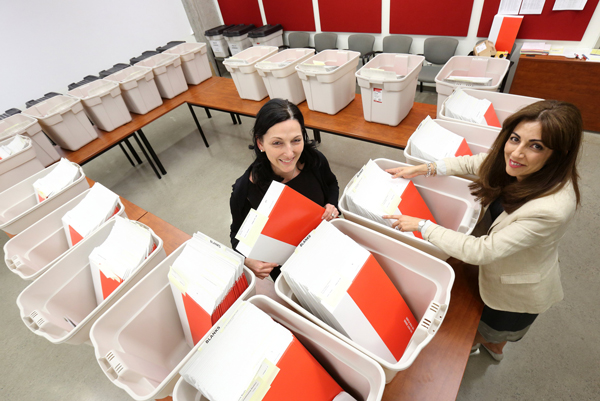
By Neale McDevitt
Paperwork. Just the word makes some people feel like a modern-day Sisyphus, ridding their desk of a mountain of paper only to have it replaced by another.
But for Enrolment Services’ Heidi Emami and Clara Spadafora, paperwork at this time of year – printing, processing and prepping thousands of diplomas for Convocation – is one of the most rewarding aspects of their respective jobs.
“I love being part of Convocation. It is one of the most important parts of my job,” says Emami, Assistant Registrar, Management of Academic Records and Examinations. “There is nothing nicer than seeing how excited students are to cross the stage and get their diploma. I’m so proud knowing we have been a part of that.”
In all, some 7,300 diplomas have been printed for Spring 2014 Convocation. By the time the last flung mortarboard has hit the ground on June 4, more than 5,000 students will have accepted a diploma that has been processed by someone from the team.
Although the whole diploma process begins in March when Faculties begin preliminary reviews of student records, it moves into high gear as soon as final exams are over and grades start coming. “That’s when things start heating up,” says Spadafora, Manager, Student Records.
The team employs what Emami calls “an in-house Convocation system” that generates files for the 13 ceremonies in the spring, including diploma templates and the all-important lineup cards that students must have in order to cross the stage. By early May, the list of all the students who are going to appear in the Convocation program has been created and sent to Secretariat.
“The system is important because there is a hierarchy and an order to each ceremony,” says Emami. “There are a lot of people walking across the stage, so it is vital everyone sticks to the plan.”
The diplomas come back from the printer in batches, divided by ceremony. “We have a team that does verification to make sure the diplomas are in the proper order, that the names are accurate and that students who are graduating in two ceremonies have the option to attend one or both,” says Spadafora. “If they are attending only one, we have to make sure their diplomas are combined. We also must process diplomas of students who have graduated in a previous session but will be taking part in this Convocation.”
The team hand-delivers the diplomas – in proper order – to each ceremony and gets them ready to be handed out by the Deans. “We also prepare a table with all the medals and awards to be handed out for each ceremony,” says Spadafora. “And, of course, we are responsible for the honorary degrees for all these extremely accomplished people. It is very exciting to say that that parchment was printed by this office.”
But the process doesn’t end when the Convocation tent is finally dismantled and packed away for another year. The team still has to mail more than 2,000 diplomas to students who did not attend the ceremonies.
And as much as Emami and Spadafora enjoy the process, they also relish the end of each ceremony. “It is very rewarding to walk through the campus during the ceremonies and watch the graduating students take pictures with their diplomas,” says Spadafora. “Of course, sometimes we see [the diplomas] being mishandled because people are so enthusiastic. We almost want to say ‘Be careful, it’s very delicate. You worked hard for that diploma, take care of it.’”
